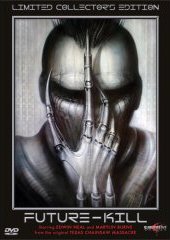
Tucking the brutality, vigour, and violence of the 1970's slasher film into a science fiction context, Future Kill features a post-apocalyptic future with radiation scarred mutants, compared to but possessing none of the stylistic verve, story logic, or overall importance of The Texas Chainsaw Massacre, reuniting some of its cast. Future Kill possess neither the directorial skill, suspense, or pacing of Texas, spending most of its padded plot engaging in long-winded cat-and-mouse shenanigans -- with bad hair, unbelievable dialogue, and funky headgear. Thankfully, what the film lacks in intelligence it makes up for in a healthy penchant for exploitation, never taking itself too seriously. Its 1980s atmosphere is bound to bring back memories (other than its obvious borrowing from The Warriors!). Willingly laughing at itself, the film is a hoot of so bad its good, and what scares are featured are well set-up.
Melding various genres into a funky roller coaster ride, Future Kill is equal parts college comedy and post-apocalyptic sci-fi vehicle. Occurring in a future Earth where a radiation accident at a research lab resulted in making mutants out of some of its urban inhabitants, Future Kill features what remains of the status quo culture against the steel-wearing deviants in the bad side of town (rather like warped anti-nuke protestors). These outsiders, resembling the mainstream's interpretation of the punk rock movement of the 80's, are organized and led by on Eddie Pain (Doug Davis), and his muscle Splatter (Edwin Neal -- yea!). While the police won't trespass into the city, a gangly group of college fraternity kids are forced to enter it as a punishment after tarring and feathering (what?!) a rival fraternity leader. Almost getting kicked out of their group, the guys save face by kidnapping one of the mutants downtown -- soon murdered by Splatter (Edwin Neal), in efforts to take control of his gang. Splatter blames the murder on the surviving frat boys, who were separated into two groups when their scheme backfired, and who now must depend on the aid of Julie, a friendly mutant, to make their way through the city.
Not as inventive, or as frightening as the cover suggests, Future Kill is far from the atrocious experience that many critics have claimed. This freak show is exciting in a goofy, slip-shod manner. A bumbling ode to the 'old dark house' genre (albeit on the streets) with the structural trappings of an exploitation slice-and-dice movie (and the look of a cheap Italian futuristic terror opus), this urban potboiler is admirable for its enthusiasm if nothing else, and is worth a look as a favorite of the bygone days of 80s video stores.
Future Kill receives a top-notch transfer from Subversive, who have cleaned up the imagery considerably. While grain and speckling are obvious, the picture is considerably better than any other available prints, and a grungy look simply instils more of a mood into the dirty action. This new 16x9 widescreen transfer lends the movie somewhat of an improved scope, lending something to the viewing experience, while audio is satisfying, doing its job professionally (albeit the track isn't as exceptional as many of Subversive's other releases).
Extras are informative and entertaining, looking into the inspiration, filming, and reception of the feature. The commentary with director Ronald Moore and actor Edwin Neal is a hoot, interweaving serious critical details with light-hearted humor. In no way self-satisfied or deluded as to the quality of this cult film, the duet are honest and playful, speaking about the bad with as much energy and detail as the good points in the movie, with Moore discussing mainly the technical matters and Neal, well, being Neal. The latter's self-depreciating humor, in-jokes, and impressions help move the track along. Neal is at his iconic best in the ensuing interview, "The World of Ed Neal: From A Chainsaw Massacre to A Future Kill." Running at around an hour, this interview is as much a live comedy sketch as a serious discussion of his career and the movie. Neal clowns around and exposes a sharp wit, making us like him by the sheer gusto of his personality as he discusses the fame/infamy of his role in Texas Chainsaw, makes with the jokes, and revisits both the film and his career. Bios are included for Neal, Marilyn Chambers, and Ronald Moore, followed by Subversive Cinema trailers. A reproduction poster of H. R. Giger's original artwork is included, making us wish, as does Neal, that Giger had played a greater part in designing the film. Lastly, a nifty Easter egg is available -- a surprise interview -- by going to the DVD credits and pushing one of the side keys.
Review by William P. Simmons
| Released by Subversive Cinema |
| Region 1 - NTSC |
| Not Rated |
| Extras : |
| see main review |